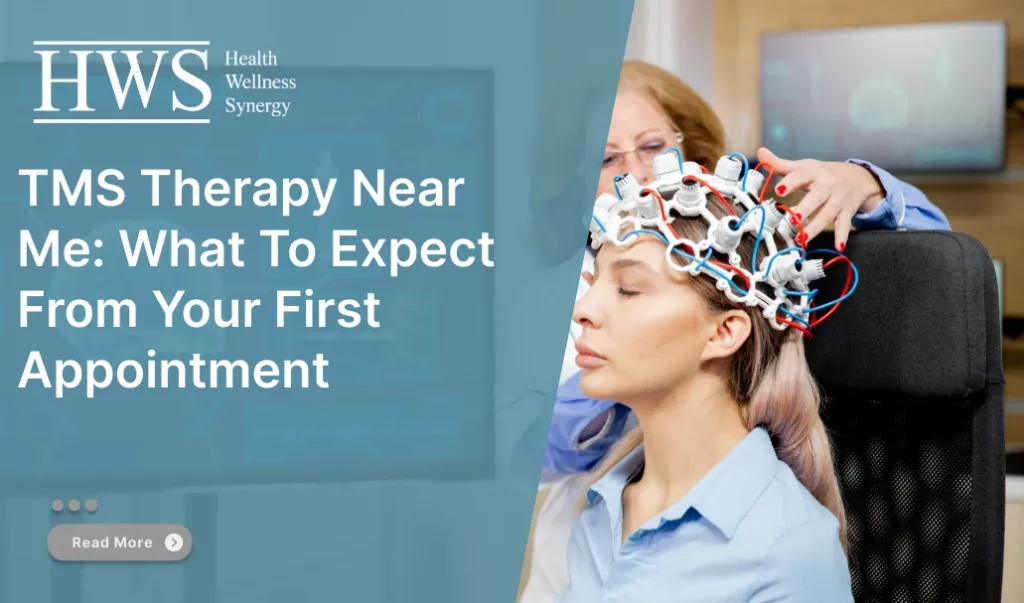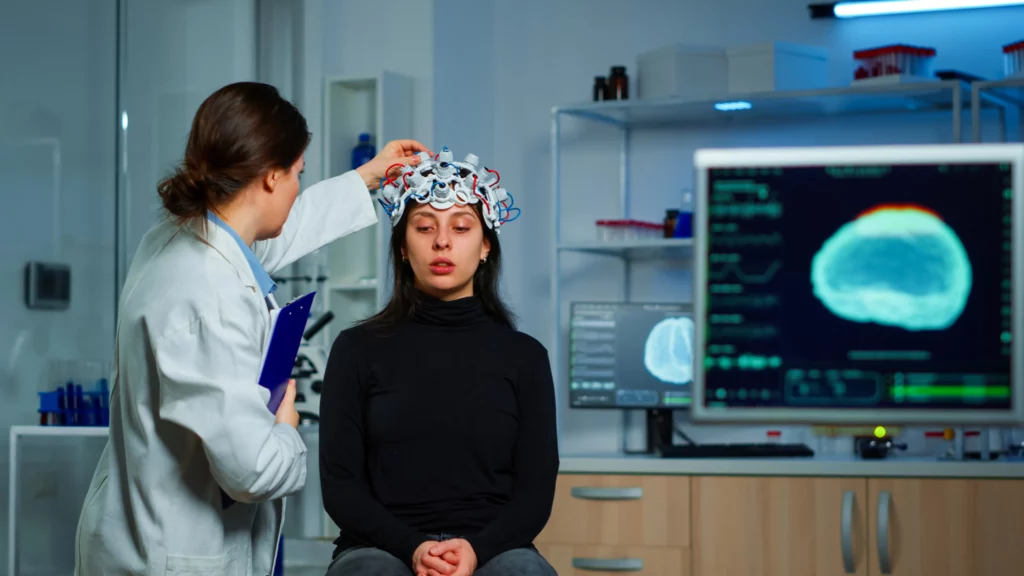
Searching for TMS Therapy Near Me often means you have reached a point where traditional treatments are not enough. You may feel tired of switching medications. You may feel stuck in the same cycle of low mood, anxiety, or slowed thinking. Many people feel nervous about their first TMS appointment because they do not know what actually happens in the room.
The truth is simple. A first TMS visit is calm, structured, and guided by trained specialists. At HWS Center, patients learn what the process looks like before treatment begins so nothing feels confusing or rushed. This overview walks you through each step so you know what to expect.
Transcranial magnetic stimulation uses focused magnetic pulses to activate brain regions linked to mood, motivation, and cognitive function. It is noninvasive. There is no anesthesia and no recovery period. You stay awake and comfortable throughout the session.
Many patients turn to TMS when medication alone does not provide enough relief. Others want an option with fewer systemic side effects. Because TMS targets specific areas of the brain, it works differently from medication based care. This makes it a strong option for people seeking a new path forward.

Your TMS journey usually starts with a screening call or consultation. A provider like HWS Center reviews your symptoms, treatment history, and medical background. You may complete mood or anxiety questionnaires to establish a baseline. These tools help track progress later.
Before your first visit, you also receive instructions on what to expect. You do not need special clothing or preparation. Most patients simply arrive ready to discuss their symptoms and goals.
After the evaluation, your provider performs a process called mapping. Mapping helps locate the exact spot on your scalp where the coil should be placed. It also helps determine your motor threshold, which sets the correct stimulation level.
You sit in a treatment chair while the provider places the coil over a region that controls hand movement. Small pulses create a light twitch in your fingers or thumb. This tells the provider how much power your brain cells need to activate. Mapping is safe, brief, and not painful.
Once mapping is complete, your first session usually begins. The provider places the coil at the marked spot. You feel tapping sensations on your scalp as the device delivers short bursts of magnetic pulses. Many patients describe it as strange at first, then easy to tolerate.
A first session may last thirty to forty minutes because settings are still being adjusted. After this, most sessions take less than half an hour. You stay awake and aware the entire time. Staff monitor you throughout to ensure comfort.

Most people stand up, stretch, and continue their day. There is no sedation and no cognitive fog. You can drive home or return to work immediately. Mild scalp tenderness or a small headache is possible, but usually fades quickly.
Your provider reviews your schedule for the full treatment series. TMS works best when sessions are consistent. Most plans involve daily visits for several weeks. Progress is checked often to make sure the treatment is working.
You do not need major preparation. Show up hydrated. Sleep well the night before. Bring questions if you have them. Many patients keep a simple mood journal to track changes across the weeks. This helps you and your provider see progress clearly.
Searching for TMS Therapy Near Me is not just about convenience. Staying close to home helps you maintain a steady schedule. That consistency is key to good results. At HWS Center, patients work with the same team throughout treatment, which builds trust and improves communication.
Beginning TMS can feel like a big step. Most people feel calmer once they know what the first visit involves. A clear evaluation. Careful mapping. A straightforward session. And no recovery time.
If you are searching for TMS Therapy Near Me and want expert, supportive care, HWS Center is here to guide you. Reach out today to schedule your first appointment and talk with a provider about your symptoms and goals. Your next chapter can start with one simple visit.
Schedule a consultation! Provide your contact information below and we’ll get back to you as soon as we can.
TMS supports healthier brain activity and helps reduce symptoms when other treatments do not work. It is a noninvasive option that fits into regular routines. Many people prefer it as a non medication treatment with minimal side effects. It is also useful for long term plans because progress is tracked through simple clinical assessments that help guide each stage of care.
Most sessions last less than thirty minutes and you can return to work right away. This makes it ideal for people who want outpatient sessions that do not disrupt daily life. The short structure supports consistency and allows the treatment series to build effects over time.
TMS is FDA cleared and does not require sedation or medication. It uses controlled magnetic pulses that target key areas linked to mood and focus. Side effects are mild and temporary. Many people choose it because it avoids systemic effects seen in medication based care and offers a predictable brain stimulation therapy option.
Yes. TMS has been shown to improve post-traumatic stress disorder, bipolar disorder, traumatic stress disorder, ADHD, and Anxiety Disorders by enhancing brain activity and promoting balanced brain function in areas linked to fear and emotional regulation.
TMS is often used for mood changes, low motivation, difficulty concentrating, and treatment resistant patterns. It can also support cognitive function and emotional balance. Providers tailor each plan based on clinical assessment results and patient feedback to improve outcomes.
Many patients notice improvement within a few weeks. The effects build as sessions continue because TMS works through repeated stimulation. Your provider reviews your symptoms often and compares them across visits. This makes the TMS mapping process and follow up evaluations important for long term results.
Yes. We welcome New Patients with a complimentary Free Consultation to discuss TMS Therapy, insurance coverage, and your personalized path toward Mental Wellness and well-being.
We use cookies to improve your experience on our site. By using our site, you consent to cookies.
Manage your cookie preferences below:
Essential cookies enable basic functions and are necessary for the proper function of the website.
Google reCAPTCHA helps protect websites from spam and abuse by verifying user interactions through challenges.
Google Tag Manager simplifies the management of marketing tags on your website without code changes.
You can find more information in our Cookie Policy and Privacy Policy.